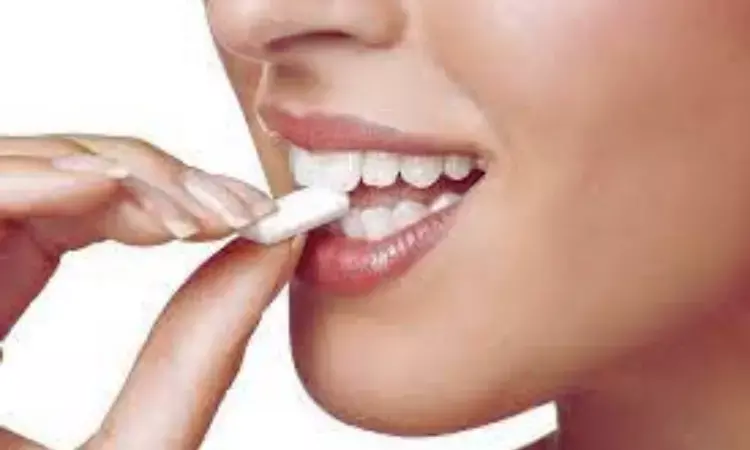- Home
- Medical news & Guidelines
- Anesthesiology
- Cardiology and CTVS
- Critical Care
- Dentistry
- Dermatology
- Diabetes and Endocrinology
- ENT
- Gastroenterology
- Medicine
- Nephrology
- Neurology
- Obstretics-Gynaecology
- Oncology
- Ophthalmology
- Orthopaedics
- Pediatrics-Neonatology
- Psychiatry
- Pulmonology
- Radiology
- Surgery
- Urology
- Laboratory Medicine
- Diet
- Nursing
- Paramedical
- Physiotherapy
- Health news
- Fact Check
- Bone Health Fact Check
- Brain Health Fact Check
- Cancer Related Fact Check
- Child Care Fact Check
- Dental and oral health fact check
- Diabetes and metabolic health fact check
- Diet and Nutrition Fact Check
- Eye and ENT Care Fact Check
- Fitness fact check
- Gut health fact check
- Heart health fact check
- Kidney health fact check
- Medical education fact check
- Men's health fact check
- Respiratory fact check
- Skin and hair care fact check
- Vaccine and Immunization fact check
- Women's health fact check
- AYUSH
- State News
- Andaman and Nicobar Islands
- Andhra Pradesh
- Arunachal Pradesh
- Assam
- Bihar
- Chandigarh
- Chattisgarh
- Dadra and Nagar Haveli
- Daman and Diu
- Delhi
- Goa
- Gujarat
- Haryana
- Himachal Pradesh
- Jammu & Kashmir
- Jharkhand
- Karnataka
- Kerala
- Ladakh
- Lakshadweep
- Madhya Pradesh
- Maharashtra
- Manipur
- Meghalaya
- Mizoram
- Nagaland
- Odisha
- Puducherry
- Punjab
- Rajasthan
- Sikkim
- Tamil Nadu
- Telangana
- Tripura
- Uttar Pradesh
- Uttrakhand
- West Bengal
- Medical Education
- Industry
Sugar-Free Chewing Gum Shows Potential for Thirst Relief Among Maintenance Hemodialysis Patients, Finds Study

China: A recent meta-analysis, published in BMC Nephrology, has found that sugar-free chewing gum may help reduce xerostomia and thirst intensity. The researchers found that stronger effects were seen in interventions lasting six weeks or longer, though no significant duration-related outcomes were confirmed. Its effectiveness varied by control type, showing benefits over non-intervention but not over active controls. While no improvements were found in salivary flow rate, overall DTI score, or interdialysis weight gain (IDWG), chewing gum appears to be a practical, low-cost adjunct for symptom management.
Lei-Wen Tang and colleagues from the Nursing Department of the Second Affiliated Hospital of Zhejiang University School of Medicine, China, aimed to assess whether chewing sugar-free gum could effectively manage thirst and dry mouth among patients undergoing maintenance hemodialysis (MHD).
Thirst is one of the most common and troublesome symptoms faced by patients on long-term dialysis. It not only reduces quality of life but also contributes to complications such as fluid overload. Despite its prevalence, no gold-standard approach exists for managing thirst in this population. Against this backdrop, sugar-free gum has been suggested as a simple behavioral intervention, but evidence supporting its effectiveness has remained unclear.
To address this gap, the research team systematically reviewed and analyzed data from seven randomized controlled trials involving 395 participants. The primary outcomes included thirst intensity, measured using the Visual Analogue Scale (VAS) and Dialysis Thirst Inventory (DTI), along with xerostomia, measured via the Summated Xerostomia Inventory (SXI). Secondary outcomes assessed salivary flow rate and IDWG. The researchers also examined whether the effects varied by intervention duration or type of control group.
Key Findings:
- Sugar-free chewing gum significantly reduced thirst scores measured by VAS.
- Xerostomia symptoms improved with the intervention.
- Interventions lasting six weeks or more showed stronger effects on thirst reduction, though statistical analysis did not confirm a significant duration-related difference.
- Compared with non-intervention controls, chewing gum lowered thirst scores on the DTI scale.
- There were no significant improvement when compared with active controls.
- There were no benefits for salivary flow rate, overall DTI scores, or IDWG.
While the results highlight potential benefits, the authors cautioned that the certainty of evidence was very low to low, based on GRADE assessment. Methodological shortcomings, such as unclear randomization, lack of blinding, and small sample sizes, contributed to this limitation. Furthermore, most included studies were conducted in Asia and the Middle East/North Africa region, which may restrict generalizability to other populations.
The authors emphasized the need for future research to adopt stronger trial designs with proper randomization, allocation concealment, and blinding. They also recommended the use of standardized evaluation tools, larger sample sizes, and comparisons with other low-cost interventions such as lemon mouthwash. Exploring multimodal strategies that combine chewing gum with additional therapies could offer a more comprehensive approach to managing thirst in MHD patients.
"The meta-analysis indicates that sugar-free chewing gum may serve as a convenient and inexpensive option to ease thirst and dry mouth among patients receiving hemodialysis. However, due to limited and low-quality evidence, its clinical use should be approached cautiously until further large-scale, high-quality trials provide more definitive answers," the authors concluded.
Reference:
Li, SY., Tang, LW., Li, J. et al. Sugar-free chewing gum’s effect on patients receiving maintenance hemodialysis: a meta-analysis of RCTs. BMC Nephrol 26, 502 (2025). https://doi.org/10.1186/s12882-025-04430-7
Dr Kamal Kant Kohli-MBBS, DTCD- a chest specialist with more than 30 years of practice and a flair for writing clinical articles, Dr Kamal Kant Kohli joined Medical Dialogues as a Chief Editor of Medical News. Besides writing articles, as an editor, he proofreads and verifies all the medical content published on Medical Dialogues including those coming from journals, studies,medical conferences,guidelines etc. Email: drkohli@medicaldialogues.in. Contact no. 011-43720751


